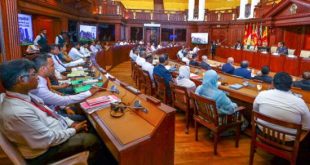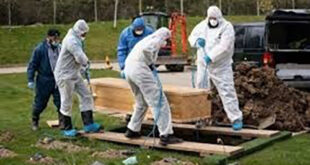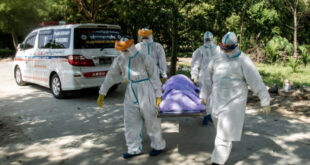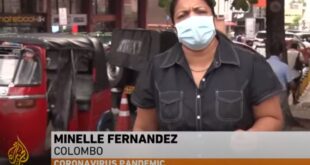 Lashing out at politicians for the present state of affairs in the country veteran Sinhala journalist Siri Ranasinghe urged them to abandon their short sighted and destructive communal and racist politics and help save the country. Known for his moderate views Siri Ranasinghe lamented that, despite different races, religions, languages and cultures a minority member could become a president or prime minister in India. However he lamented that this is not even a distant dream in Sri Lanka due to communal and racist politics.
Lashing out at politicians for the present state of affairs in the country veteran Sinhala journalist Siri Ranasinghe urged them to abandon their short sighted and destructive communal and racist politics and help save the country. Known for his moderate views Siri Ranasinghe lamented that, despite different races, religions, languages and cultures a minority member could become a president or prime minister in India. However he lamented that this is not even a distant dream in Sri Lanka due to communal and racist politics.
The occasion was the launching of a book on the biography of former Speaker of National State Assembly Deshamanya Mohamed Bakeer Markar under the title “Weda Gedera Viplavaya” ( Doctors’ House Revolution) at Sri Lankan Foundation on 29 October 2013.
Invitees included politicians from both the government and the opposition. They were all seated in the front row. In a scathing attack and indictment on them the unassuming Ranasinghe boldy told “the home truths” stating how they ruined this country with their selfish politics.
The largely attended function was also addressed by Senior Minister and Leader of the House Nimal Siripala de Silva, Registrar of the Siyam Nikaya Ven Kotapitiye Rahula Thera and former education minister Karunasena Kodituwakku. They all rejected in one voice communal and racist politics highlighting that the overall system need to be overhauled to place the country in a footing if we are to move and.
It was music to the ears of the audience which rejected communal politics which divided and virtually destroyed this country.
At the time of independence in 1948 Sri Lanka was an enviable role model for newly emerging countries in Asia, Africa and even Latin America. The island then was blessed with political stability, racial harmony despite communalized politics, economic stability and a very high literacy rate which only few countries in what was later known as Third World, could boast of. Those were the days when Sri Lanka’s university degrees were recognized and respected in all member countries of the Commonwealth of Nations. Our health services were regarded so highly that many South Indians came here for medical treatment.
Thus Sri Lanka had every required political, economic and social ingredient to march towards progress, but lacked a visionary leadership from the majority community which could think for the whole country, ensure the rights and privileges of all communities and lead the people as one nation.
It is our misfortune that our leaders who united in their effort to win independence ignored this call.” In fact before and after the independence communalism began rising its ugly head with Sinhalese political leaders openly championing the cause of the majority community ignoring minorities.
Little did they realize that the chauvinism they fanned “alienated” the communities and caused damage to the country as a whole?
They not only worked for the interest of the majority community but also went to the extent of even depriving the rights and privileges of the minority communities.
For example, within two years after the independence, they passed the Citizenship Act No 18 of 1948, Indian and Pakistani Residents (Citizenship) Act No 03 of 1949 followed by the Parliamentary Elections (Amendments) Act and deprived large number of Indian Tamil residents in Sri Lanka of their citizenship rights and franchise. The irony is that it was Tamil and Muslim votes that deprived the estate Tamils of their citizenship. According to some, the Citizenship Acts were partly aimed at Indian Muslims who had come to dominate many local businesses.
However some who saw the danger in the seeds of ethnic discord being sown started a low-profile campaign warning Sinhalese, Tamils, Burghers and Muslims to unite as citizens of one nation.
Yet the shortsighted politicians who were only keen on power unleashed communal slogans opening the floodgates of hatred which divided the communities. The two major parties competed with each other in pampering the Sinhalese aiming for their votes. Sinhalese chauvinism in turn paved the way for Tamil communalism which began to radicalize the youth. Even at that stage, the leadership in the south failed to understand the seriousness of the emerging disaster.
Six and half decades later today Sri Lanka is described as one of the most mismanaged countries in the world. The reputation earned was such that even Singapore ’s then Prime Minister, Lee Kwan Yew, who once described Sri Lanka as the role model for developing countries, called the island a failed state in early September 2007.He said that the “mistakes of Sri Lanka and other newly independent “failed” states made Singapore go in a different direction. In 1965 we had 20 years of examples of failed states and we knew what to avoid: racial and religious conflicts and linguistic strife we saw in Ceylon. We knew that if we embark on any of these romantic ideas to revive a mythical past of greatness and culture, we’d be damned. Therefore we turned English into a working language and thereby kept all communities together and turned Singapore into what it is today”. The message is quite clear!
’s then Prime Minister, Lee Kwan Yew, who once described Sri Lanka as the role model for developing countries, called the island a failed state in early September 2007.He said that the “mistakes of Sri Lanka and other newly independent “failed” states made Singapore go in a different direction. In 1965 we had 20 years of examples of failed states and we knew what to avoid: racial and religious conflicts and linguistic strife we saw in Ceylon. We knew that if we embark on any of these romantic ideas to revive a mythical past of greatness and culture, we’d be damned. Therefore we turned English into a working language and thereby kept all communities together and turned Singapore into what it is today”. The message is quite clear!
As highlighted in the media on a daily basis, the entire political system has become corrupt, criminalized and commercialized leaving little room for serious development. The ruling elite belonging to all political opinions which maintained ruthless control over the island’s politics were solely responsible for six and half decades of mismanagement which created the current tragic state of affairs.
Indicating the depth to which the country has descended former President Chandrika Kumaratunga, herself accused of widespread corruption and misrule, and said that more than 60 percent of those who enter politics do so for doing business.
Inevitably, political instability has become the order of the day. Communities remain divided and the ethnic war also opened floodgates for sinister and destructive players from all corners of the world, with their own agendas, to enter the country, further complicating the already complicated and complex political scene.
Exploiting the vast opportunities under the globalised economic environment, almost every country in the region is surging ahead to provide their people with a higher standard of living. Even Vietnam, once a basket case, set aside its past and started moving ahead towards economic progress.
India has numerous religions, races, languages and cultures learnt to march ahead in unity in diversity to emerge as an economic giant. There was a time even in the early 1970s that an Indian rupee was equal to about Sri Lanka’s forty cents. Today, an Indian rupee is equivalent to two and half times that of the Sri Lankan currency.
The Maldives Islands, once dismissed as a poor and insignificant country, turned to Sri Lanka as home away from home for almost everything from education to health services. Today the Maldives has made remarkable economic progress and its per capita income is three times that of Sri Lanka. Some even describe the Maldives as the richest country in Asia.
In yet another example, Dubai was an almost unknown and unheard-of place when we gained independence. There were no proper buildings other than traditional mud houses. There were no roads, schools, hospitals and basic facilities such as water and electricity were unheard of. The entire population was illiterate and most of them were involved in fishing and the dry fish industry in harsh weather conditions.
People of Dubai, who constitute less than ten percent of the total population of the United Arab Emirates, also have their own religion and culture, blending Islamic traditions and tribal customs. Yet they openly welcome expatriates, irrespective of race, religion, language or culture, who could make their contributions and who made the Emirate what it is today. Until April 2008 Dubai, an economic miracle, managed our national flag carrier Air Lanka.
Though a city state, there is a lot Sri Lanka could learn from this experience.
Are we in a mood to learn from these experiences? There is no sign at all. The situation continues to deteriorate with nationalists emerging as dominant players in the government. They firmly believe that there is only one nation in the island and that is the Sinhalese nation which should rule the country and others should learn to follow.
All expected everyone to learn bitter lessons from the 30 year ethnic carnage. However no lesson was learnt despite all the destruction and loss of lives. Instead since the end of the ethnic war in May 2009 overall Sinhalisation has been underway in full swing, sidelining minorities.
Under the existing circumstances, the road to communal harmony and peaceful coexistence seems to be not even distant dream despite empty slogans of reconciliation.
Though a Himalayan task, initiatives need to be taken to ensure that at least the future generations could live in peace and harmony.
The presidential system of government has failed, and for more than two decades there were demands from many quarters, from all communities, to change the system. It was one of the most important issues during the 1993 presidential elections. President Chandrika Kumaratunga was voted into power in 1994 on a pledge to change this system. But once in the seat of power she changed her mind. Not once but twice and took the country for a ride. Such was the taste and temptation of absolute power!
Absolute power in the hands of an individual, and that too with no accountability to parliament or to the country, proved to be a monumental disaster for the island which continues to pay the price.
India’s Nobel Laureate Amartya Sen once observed that Sri Lanka is in crisis because it failed to realize the richness of plurality. Delivering his Spring Lecture on Poverty, War and Peace, at the Nobel Institute in Oslo, on Monday 21 May 2007, Prof. Sen said:
“Sri Lanka successfully implemented a number of welfare programmes such as free education and free health for its people which should have contributed to peace in that country. But, by taking a position of upholding exclusive status to Buddhism and Sinhalese, it isolated other sections of the society from having a sense of national identity. Now, there is no likelihood that the Sri Lankan state will go back from that position. Sri Lanka didn’t realize the richness in plurality”.
It was in this context one ought to view Siri Ranasinghe’s call for politicians to think of the country and not their own interests.
 Sri lanka Muslims Web Portal Diversity and Inclusiveness
Sri lanka Muslims Web Portal Diversity and Inclusiveness



